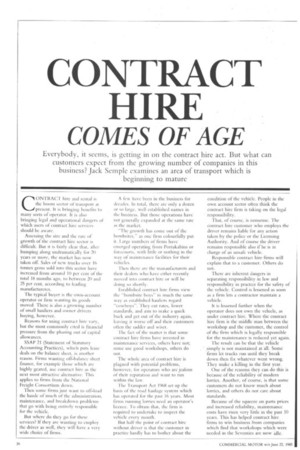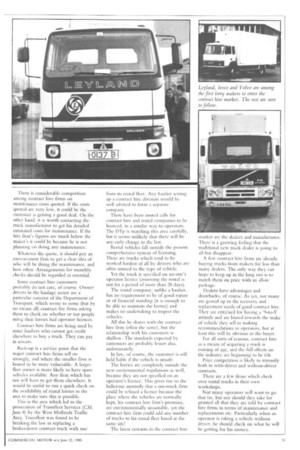CONTRACT HIRE
Page 32

Page 33

If you've noticed an error in this article please click here to report it so we can fix it.
COMES OF AGE
Everybody, it seems, is getting in on the contract hire act. But what can customers expect from the growing number of companies in this business? Jack Semple examines an area of transport which is beginning to mature
CONTRACT hire and rental is the boom sector of transport at present. It is bringing benefits 'to many sorts of operator. It is also bringing legal and operational dangers of which users of contract hire services should be aware.
Assessing the size and the rate of growth of the contract hire sector is difficult. But it is fairly clear that, afteibumping along undramatically for 20 years or more, the market has now taken off. Sales of new trucks over 16 tonnes gross sold into this sector have increased from around 10 per cent of the total 18 months ago, to between 20 and 25 per cent, according to leading manufactureres.
The typical buyer is the own-account operator or firm wanting its goods moved. There is also a growing number of small hauliers and owner drivers buying, however.
Reasons for using contract hire vary, but the most commonly cited is financial pressure from the phasing out of capital allowances.
SSAP 21 (Statement of Statutory Accounting Practices), which puts lease deals on the balance sheet, is another reason. Firms wanting off-balance sheet finance, for example those which are highly geared, use contract hire as the next most attractive alternative. This applies to firms from the National Freight Consortium down.
Then some firms just want to off-load the hassle of much of the administration, maintenance, and breakdown problems that go with being entirely responsible for the vehicle.
But where do they go for these . services? If they are wanting to employ the driver as well, they will have a very wide choice of firms.
A few have been M the business for decades. In total, there are only a dozen Or so large, well established names in the business. But those operations have not generally expanded at the smile rate as the market.
"The growth has conic out of the bombsites.as one firm colourfully put it. Large numbers of firms have emerged operating from Portakabins or forecourts, with little or nothing in the way of maintenance facilities for their vehicles.
Then there ACC the manaufacturers and their dealers who have either recently moved into contract hire or will be doing so shortly.
Established contract hire firms view the "bombsite boys" in much the same way as established hauliers regard "cowboys".'They.cut rates, lower standards, and aim to make a quick buck and get out of the industry again, leaving it worse off and their customers often the sadder and wiser.
The fact of the matter As that sonic contract hire firms have invested in maintenance services, others have not; some use good workshops, others do not.
The whole area of contract hire is plagued with potential problems, however, for operators who are jealous of their reputation and want to run within the law.
The Transport Act 1968 set up the basis of the road haulage system which has operated for the past 16 years. Most firms running lorries need an operator's licence. To obtain that, the firm is required to undertake to inspect the vehicle every month.
But half the point of contract hire without driver is that the customer in practice hardly has to bother about the condition of the vehicle. People in the on account sector often think the contract hire firm is taking on the legal responsibility.
That, of course, is nonsense. The contract hire customer who employs the driver remains liable for any action taken by the police or the Licensing Authority. And of course the driver remains responsible also if he is in charge of an unsafe vehicle.
Responsible contract hire firms will explain that to a customer. Others do not.
There are inherent dangers in separating responsibility in law and responsibility in practice for the safety of the vehicle. Control is lessened as soon as a firm lets a contractor maintain a vehicle.
It is lessened further when the operator does not own the vehicle, as under contract hire. Where the contract hire firm is the middle man between the workshop and the customer, the control of the firm which is legally responsible for the maintenance is reduced yet again.
The result can be that the vehicle _simply is not maintained at all. Some firms let trucks run until they break down then fix whatever went wrong. They make a killing in the first year.
One of the reasons they can do this is because of the reliability of modern lorries. Another, of course, is that some customers do not know much about lorries, and others do not care about standards.
Because of the squeeze on parts prices and increased reliability, maintenance costs have risen very little in the past 10 years. This has helped, contract hire firms to win business from companies which find that workshops which were needed in the Seventies are now idle.
There is considerable competition among contract hire firms on maintenance costs quoted. lithe costs quoted are very low, it could be the customer is getting a good deal. On the other hand, it is worth contacting the truck manufacturer to get his detailed estimated costs for maintenance. If the hire firm's figures are much below the maker's it could be because he is not planning on doing any maintenance.
Whatever the quote, it should pay an own-account firm to get a clear idea of who will be doing the maintenance, and how often. Arrangements for monthly checks should be regarded as essential.
Some contract hire customers probably do not care, of course. Owner drivers in the haulage sector are a particular concern of the Department of Transport, which wrote to some (but by no means all) contract fire firms asking them to check on whether or not people using their lorries had operator licences.
Contract hire firms are being used by some hauliers who cannot get credit elsewhere to buy a truck. They can pay in arrears.
Back-up is a service point that the major contract hire firms sell on strongly, and where the smaller firm is bound to be more vulnerable. A largefleet owner is more likely to have spare vehicles available. Any firm which has not will have to get them elsewhere. It would be useful to run a quick check on the availability of rental lorries in the area to make sure this is possible.
This is the area which led to the prosecution of Trans fleet Services (CM, June 8) by the West Midlands Traffic Area. Transfleet was found to be breaking die law in replacing a brokendown contract truck with one from its rental fleet. Any haulier setting up a contract hire division would be well advised to form a separate company.
There have been muted calls for contract hire and rental companies to be licenced, in a similar way to operators. The DTp is watching this area carefully, but it seems unlikely that there will be any early change in the law.
Rental vehicles fall outside the present comprehensive system of licensing. These are trucks which tend to be worked hardest of all by drivers who are often unused to the type of vehicle.
Yet the truck is specified on no-one's operator licence (assuming the rental is not for a period of more than 28 days).
The rental company, unlike a haulier, has no requirement to be of good repute or of financial standing (it is enough to be able to maintain the lorries) and makes no undertaking to inspect the vehicles.
All this he shares with the contract hire firm (often the same), but the relationship with his customers is shallow. The standards expected by customers are probably lower also, unfortunately.
In law, of course, the customer is still held liable if the vehicle is unsafe.
The lorries arc completely outside the new environmental regulations as well, because they are not specified on an operator's licence. This gives rise to the ludicrous anomoly that a one-truck firm could be refused a licence because the place where the vehicles are normally kept, his contract hire firm's premises, are environmentally unsuitable, yet the contract hire firm could add any number of trucks to his rental fleet based at the same site!
The latest entrants in the contract hire market are the dealers and manufactures. There is a growing feeling that the traditional new truck dealer is going to all but disappear.
A few contract hire firms are already buying trucks from makers for less than many dealers. The only way they can hope to keep up in the long run is to match them on price with an all-in package.
Dealers have advantages and drawbacks, of course. As yet, not many are geared up to the recovery and replacement needs of good contract hire. They are criticised for having a '9-to-5' attitude and are biased towards the make of vehicle they sell in making recommendations to operators, but at least this will be obvious to the buyer. For all sorts of reasons, contract hire as a means of acquiring a truck is coining of age, and the full effects on the industry are beginning to be felt. Price competition is likely to intensify both in with-driver and without-driver contracts.
There arc a few firms which check over rental trucks in their own workshops.
Not many operators will want to go that far, but nor should they take for granted all that they are told by contract hire firms in terms of maintenance and replacements etc. Particularly when an operator is taking a vehicle without driver, he should check on what he will be getting for his money.




































































































